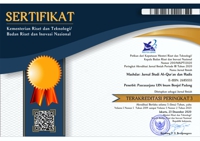Tawakkul in the Qur'an as Coping Mechanism for IIUM Student Mastery in Coping with the Covid-19 Challenges
DOI: 10.15548/mashdar.v4i2.4824Abstract
Keywords
Full Text:
PDFReferences
ʿAbd al-Baqī, Muḥāmmad Fu’ād. Al-Dalīl Al-Mufahras Li Al-Alfāẓ Al-Qur´ān Al-Karīm. 2nd edn. Beirut: Dār al-Fikr, 1981.
Abdel Haleem, M.A.S. The Qur’ān / A New Translation by M. A. S. Abdel Haleem. United States: Oxford University Press, 2004.
Abdul Malik Karim Amrullah. Tafsīr Al-Azhar. Jakarta: Pustaka Pinjamas, 1987.
Abiddin, Z., Sakinah Salleh, R Embong, N Noruddin, Zuraidah Kamaruddin, and Sultan Zainal Abidin. “Spiritual Coping Strategies from the Islāmic Worldview.” In International Conference on Empowering Islamic Civilization in the 21th Century, 2015.
Abū ‘Abdullāh Muḥammad ibn Aḥmad al-Qurṭubī. Tafsīr Al-Qurṭubī, Translated by Aisha Bewley. British: Diwan Press Ltd, 2021.
Achmad. “Tawakkal Dalam Perspektif Islam.” Syaikhuna: Jurnal Pendidikan Dan Pranata Islam 10 (2019).
Achour, Meguellati, Benaouda Bensaid, and Mohd Roslan Bin Mohd Nor. “An Islamic Perspective on Coping with Life Stressors.” The International Society for Quality of Life Studies (ISQOLS), 2015.
Ahmad, Hamdi Putra. “Construction of Indonesian Cultural Thoughts in Tafsir Al-Azhar as Hamka’s Teaching Practice; Text Analysis Using George Herbert Mead Communication Theory.” Journal of Islāmic Culture and Education 2 (2017).
Ahmed, Elkadi. “Quranic Concepts for Eliminating Negative Emotions: Another Aspect of the Healing Effects of the Qur’an.” Traditional Health System and Public Policy, 1994, 150.
Altwaijiri, Nouf, Turki Abualait, Mohammed Aljumaan, Raidah Albaradie, Zahid Arain, and Shahid Bashir. “Defense Mechanism Responses to COVID-19.” PeerJ, no. February 2022 (2022). https://doi.org/10.7717/peerj.12811.
Badri, Malik. Contemplation: An Islamic Psychospiritual Study. Washington: International Institute of Islamic Thought, 2018.
Bazmul, Muhammad. “Contemplation of the Qur’an and Its Effect Regarding Purification of the Soul.” Authentic Statements Publishing, 2017, 27.
GoodTheraphy. “Coping Mechanisms,” 2018. https://www.goodtherapy.org/blog/psychpedia/coping-mechanisms.
Heryanto, Agus. “Konsep Tawakkal Perspektif Hamka Telaah Semantik Ayat Tawakkal Dalam Tafsir Al-Azhar Surah Ali ‘Imran Ayat 159.” El-Furqania 8 (2021).
IIUM STUDENT UNION. “IIMSU CMCO Extension Report 2020,” 2020.
Johnson, Sharon. Therapist’s Guide to Posttraumatic Stress Disorder Intervention. 1st Editio. United States: Academic Press, 2009.
Miswar. “Konsep Tawakkal Dalam Al-Qur’an.” Ihya Al-Arabiyah 4 (2018).
Muhammad Al-Mahdi Jenkins and Abdul Aziz Bin Azimullah. Positive Islāmic Psychology. Selangor: Excellent Ummah Development Association, 2016.
Nur Hadi Ihsan. “Hamka’s Doctrine of Tawakkul (Trust in God).” Kalimah 2 (2003).
Qudsy, Saifuddin Zuhri, Mustaqim Pabbajah, Hasse Jubba, Muhammad Zain, and Arkan Syafera. “COVID-19 Pandemic in Indonesia: Some Reflections from Bażl Al-Māʿūn by Ibn Ḥajr Al-ʿAsqalānī.” Journal of Aqidah and Islamic Thought, no. Afkar special issue on COVID-19 (2022): 61–98.
Sahl ibn ʿAbd Allāh al-Tustarī. Tafsir Al-Tustarī, Translated by Annabel Keeler and Ali Keeler. Amman: Royal Aal al-Bayt Institute for Islamic Thought, 2011.
Sayeed, Shabbir Ahmed, and Anand Prakash. “The Islamic Prayer (Salah/Namaaz) and Yoga Togetherness in Mental Health.” Indian Journal of Psychiatry, 2015.
Refbacks
- There are currently no refbacks.













